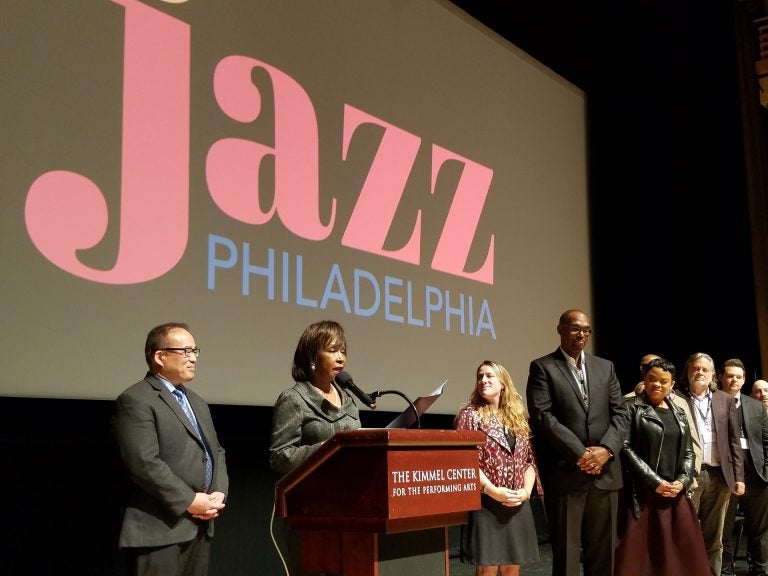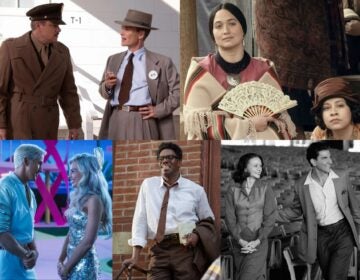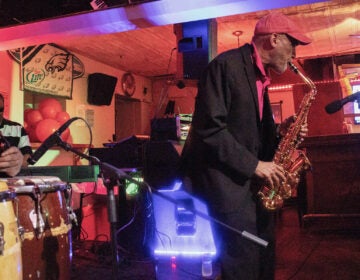Philadelphia jazz gets a boost from new nonprofit
Jazz Philadelphia, a new support organization for jazz in the city, launches with a weekend conference on the art and business of music.

Philadelphia Councilwoman Blondell Reynolds Brown reads a resolution in support of Jazz Philadelphia at the opening of a jazz summit in the Kimmel Center. Councilman David Oh is at left. (Peter Crimmins/WHYY)
A new organization to support jazz in Philadelphia has launched its mission with a two-day conference for musicians and institutions involved with the art and business of jazz.
Jazz Philadelphia aims to advance the education, funding, and creative progression of the musical form. Funded by the Wyncote Foundation, it has the backing of City Council.
City Councilman David Oh and Councilwoman Blondell Reynolds Brown presented an official resolution at the opening of the Jazz Philadelphia summit at the Kimmel Center to recognize the importance of jazz to the city.
An estimated 500 people are expected to attend the summit, which continues through Saturday, and features performances and panel discussions about music education, grant-writing for institutions, and business chops for musicians.
“The funding scene in Philadelphia for jazz is thin, to say the least, even though it’s an art form we should be investing in,” said Heather Blakeslee, Jazz Philadelphia’s executive director. “We really don’t have that many people funding jazz locally, regionally, or in the state.”
“Philadelphia has a really long, deep history of jazz. This isn’t coming out of nowhere,” she said. “We’re collectively in the middle of a city cultural renaissance. There’s no other art form that makes more sense to invest in.”
Tellingly, the first-panel discussion on the first day of Jazz Philadelphia’s first event was about money.
Jeff Hornstein, executive director of The Economy League of Greater Philadelphia, sat on a panel about the economic impact of jazz and said the city needs to take an inventory of its jazz assets.
“We need to know what the jazz space is. We have some sense of venues, some sense of sites, but there’s nowhere I’ve seen where that’s all mapped out,” he said. “We have great tools now. Technology has come to the point where we can do this in a very sophisticated, very granular way.”
Hornstein cited a project taken up in Chicago that tracks audience movements on the night of a particular event, through their credit cards. Last summer, Mastercard followed the money spent with credit cards during the Chicago Blues Festival and Jazz Festival, respectively, to monitor transactions before, during, and after the ticketed event.
Acknowledging the technique was “creepy,” he said the data could be much more accurate than the economic impact reports generated by many nonprofit arts organizations.
In order to map Philadelphia’s jazz assets as data points, Hornstein said, the venues, musicians, organizations, and programs that leverage jazz in their work need a working definition of “jazz.”
What exactly is jazz? How broadly should it be quantified? Does it include hip hop that samples classic jazz? A Philly Pops performance of jazzy standards?
Blakeslee wants to spread the jazz tent wide, anticipating some disagreements inside. She invites the jazz community — however it defines itself — to register at jazzphiladelphia.org and become part of the discussion.
Ultimately, Blakeslee aims to go beyond the choir of local jazz heads and show off the city’s music legacy far and wide, “to rebrand the city as an international jazz destination,” she said. “We already are, but we don’t talk about ourselves that way.”
Philadelphia can claim Billie Holiday, Grover Washington, and the Sun Ra Arkestra, among many others. The city’s legendary clubs like the Showboat, Zanzibar Blue, and Ortlieb’s made the city a destination for top musicians.
Jazz Philadelphia wants to package the past and foster of future of the music in Philadelphia, to make it a destination again.
“People come here because we have the Liberty Bell, right? No one else has that,” said Hornstein. “We have John Coltrane’s house. No one else has that. For people in this day and age, experience is everything.”
WHYY is your source for fact-based, in-depth journalism and information. As a nonprofit organization, we rely on financial support from readers like you. Please give today.





